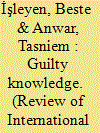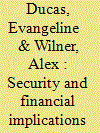|
|
|
Sort Order |
|
|
|
Items / Page
|
|
|
|
|
|
|
| Srl | Item |
| 1 |
ID:
088558


|
|
|
|
|
| Publication |
2009.
|
| Summary/Abstract |
This article addresses criticism that the English School fails to test empirically the validity of its main claims. The article takes a neglected yet highly significant aspect of the international society, its preservation-seeking quality, and tests it. It hypothesizes that if the international society truly exists and is inclined to act in order to guarantee its survival, its members should respond to threats to the existence of the society with rigorous collective action atypical of `normal politics'. To validate the hypothesis, the article examines the way in which members of the international society have responded to the systemic threat posed by the al Qaeda-led jihadi movement, focusing on the regime to suppress the financing of terrorism. Subsequently, the article lauds the theoretical contribution of the English School to understanding systemic threats, as well as its unique exposition of the war on terrorism.
|
|
|
|
|
|
|
|
|
|
|
|
|
|
|
|
| 2 |
ID:
090268


|
|
|
|
|
| Publication |
2009.
|
| Summary/Abstract |
This article addresses criticism that the English School fails to test empirically the validity of its main claims. The article takes a neglected yet highly significant aspect of the international society, its preservation-seeking quality, and tests it. It hypothesizes that if the international society truly exists and is inclined to act in order to guarantee its survival, its members should respond to threats to the existence of the society with rigorous collective action atypical of `normal politics'. To validate the hypothesis, the article examines the way in which members of the international society have responded to the systemic threat posed by the al Qaeda-led jihadi movement, focusing on the regime to suppress the financing of terrorism. Subsequently, the article lauds the theoretical contribution of the English School to understanding systemic threats, as well as its unique exposition of the war on terrorism
|
|
|
|
|
|
|
|
|
|
|
|
|
|
|
|
| 3 |
ID:
193303


|
|
|
|
|
| Summary/Abstract |
This article studies practices of knowledge production during counterterrorism financing court cases in European courts. Developments in international law have contributed to novel regulations to criminalise and prosecute the funding of terrorism in advance of terrorist violence. In this study, we study how court cases have become important spaces for contesting and evaluating multiple knowledge claims on terrorist threat and suspicion by analysing case proceedings from both the Netherlands and the United Kingdom. Building on recent debates in International Relations and postcolonial theory, we make two contributions. First, building on insights from postcolonial literature on ‘abyssal thinking’, we illustrate how legal practices differentiate between different ways of knowing by dismissing certain experiences as ‘emotional’ or ‘subjective’ in contrast to the assumed objectivity of other knowledge claims. We argue that decisions on what counts as knowledge in a court setting are situated in a specific sociopolitical setting, whereby particular knowledge and life-worlds are recognised at the expense of others. Second, we empirically show how the novel criminal laws shifts the responsibility to know terrorist threat from the state to ordinary citizens. We illustrate how the court reinforces new security logics where the state can entertain doubt, uncertainty, and trust in their practices, while the citizens cannot.
|
|
|
|
|
|
|
|
|
|
|
|
|
|
|
|
| 4 |
ID:
157682


|
|
|
|
|
| Summary/Abstract |
Driven by advances in data analytics, machine learning, and smart devices, financial technology is changing the way Canadians interact with the financial sector. The evolving landscape is further influenced by cryptocurrencies: non-fiat, decentralized digital payment systems, like Bitcoin, that operate outside the formal financial sector. While Bitcoin has garnered attention for facilitating criminal activity, including money laundering, terrorism financing, digital ransomware, weapons trafficking, and tax evasion, it is Bitcoin's underlying protocol, the blockchain, that represents an innovation capable of transforming financial services and challenging existing security, financial, and public safety regulations and policies. Canada's challenge is to find the right balance between oversight and innovation. Our paper examines these competing interests: we provide an overview of blockchain technologies, illustrate their potential in Canada and abroad, and examine the government's role in fostering innovation while concurrently bolstering regulations, maintaining public safety, and securing the integrity of financial systems.
|
|
|
|
|
|
|
|
|
|
|
|
|
|
|
|
| 5 |
ID:
164591


|
|
|
|
|
| Summary/Abstract |
This article considers the terrorism financing risk associated with the growth of Financial Technology innovations and in particular, focuses on virtual currency products and services. The ease with which cross-border payments by virtual currencies are facilitated, the anonymity surrounding their usage, and their potential to be converted into the fiat financial system, make them ideal for terrorism financing and therefore calls for a coordinated global regulatory response. This article considers the extent of the risk of terrorism financing through virtual currencies in “high risk” States by focusing on countries that have been recently associated with terrorism activities. It assesses the robustness of their financial regulatory and law enforcement regimes in combating terrorism financing and considers the extent to which Regulatory Technology and its global standardization, can mitigate this risk.
|
|
|
|
|
|
|
|
|
|
|
|
|
|
|
|
|
|
|
|
|